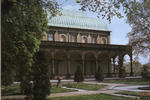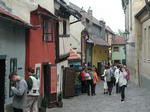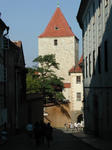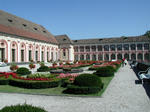
The history of the city
goes back to the foundation of Prague Castle by Borivoj in 870 AD. Prague Castle has been a symbol of Czech history for centuries. After 894 it became the main seat of the oldest ruling dynasty of the state Bohemia, the Premyslid princes (Premyslovci). The first to leave a written record of the existence of a busy commercial centre and settlement below Prague Castle was the Arab-Jewish merchant Ibrahim Jakub, who visited Prague in 965 or 966 and described it as a town "built of stone and mortar". During the first half of the 11
th century, on the opposite bank of the Vltava another castle was founded, called Vysehrad. The house of the Premyslids, also present at its birth, thereby demarcated future settlement areas. At the same time
the first stone bridge (Judith's) was built.
In 1230 Prague became a town during 13
th century the Old Town and the Lesser Town were founded by colonization. The beginning of the fourteenth century saw a series of dynastic disputes - beginning with the death of Vaclav II. from consumption and excess in 1305. The following year, the murder of his son , the heiress, Vaclav III., marked the end of the Premyslid dynasty and Bohemia was left without any heirs.
In 1310 Czech nobles offered the throne to
John of Luxembourg but it was
his son Charles IV. (1346-1378), king of Bohemia and Holy Roman Emperor, who ushered in Prague's golden age and made it his residential capital. King Charles IV. carried out the reconstruction of Prague in High Gothic style, adding new, expensive buildings such as the Castle, at Vysehrad and in the town.He founded the oldest university in Central Europe in Prague (1348) (now called Charles University), founded and built the New Town of Prague (1348) and adorned his

residential town with numerous structures and public buildings like Charles Bridge(1357), magnificient St. Vitus' cathedral, the Slavonic Abbey, the church at Karlov and many others). With its 40 000 inhabitants and covering an area of 8.1 km
2 Prague became one of the largest towns in Europe at that time (second only to Rome according to some sources). Shortly after the Emperor's death in 1378 difficulties cropped up.
In 1541 there was a great fire at Prague Castle, in Hradcany and the Lesser Town. Nor did Prague become the seat of the throne when Ferdinand the Roman Catholic Habsburg was elected King of Bohemia (1526) and the Kingdom of Bohemia became part of the Habsburg monarchy and after the defeat of the first anti-Habsburg uprising of the Bohemian Estates (1547) the Prague Towns people lost a large part of their property and political privileges. But it was a period when culture flourished thanks to the personality and court of the art-loving Emperor
Rudolph II. (1576-1612) who moved his seat to Prague in 1583 and endowed Prague's galleries with the best Mannerist art in Europe and invited the respected astrologist
Tycho de Brahe and Johannes Kepler and other famous scientists. From 1575 to 1577 there was a struggle over the Bohemian Confession, from 1608 to 1611 one of the focal points was the question of a successor to Rudolph II.
Unmistakable signs of reawakening appeared in Prague towns at the outset of the 18
th century. Commercial
life developed favourably and many factories started working in the city. In 1784 Emperor Joseph II. merged the four historical Prague Towns (
the Old Town, New Town, Lesser Town and Hradcany) into one unified Capital City of Prague, which became the core of industrialization of Bohemia and the centre of Bohemian national revival. In Prague in the Josephine era the most diverse influences came to bear, giving rise to favourable conditions for the advance of the Czech National Reawakening.
At the end of 30's on
15th March 1939 Hitler's armies occupied Prague. The anti-fascist resistance of the people of Prague lasted more than six years, and, after the closure of the Czech universities on 17 November 1939 (International Student's Day) and the assassination of the "Reichsprotektor" R. Heydrich (27 May 1942), reached its culmination in the
Prague Uprising (5-9 May 1945).
After 1945 Prague's role, size, structure and social importance were decided even more emphatically by national aspects imposed on it, without taking much account of the city's own development needs. With
the Cold War in full swing the Stalinization of Czechoslovakian society was quick to follow.
In the year 1968 movement demanding "socialism with a human face" reached its climax. This events of the, so-called "Prague Spring", lead to the invasion of Czechoslovakia. On 21
st August 1968 five countries of the Warsaw Pact occupied Prague.
On
January 1st 1993, after the split of Czechoslovakia, Prague became the capital of the Czech Republic.



 Guide
Guide 





